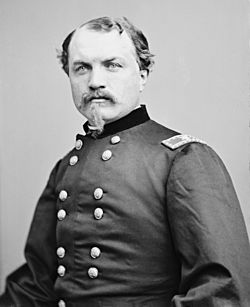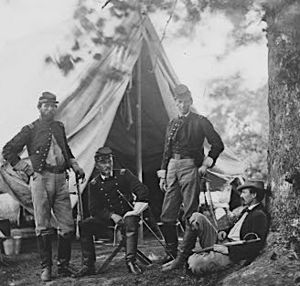William W. Averell facts for kids
Quick facts for kids
William Woods Averell
|
|
|---|---|

William W. Averell
|
|
| Born | November 5, 1832 Cameron, New York |
| Died | February 3, 1900 (aged 67) Bath, New York |
| Allegiance | United States of America Union |
| Service/ |
United States Army Union Army |
| Years of service | 1855–1865 |
| Rank | |
| Commands held | 3rd Pennsylvania Cavalry |
| Battles/wars | American Civil War |
| Other work | U.S. Consul General Inventor |
William Woods Averell (November 5, 1832 – February 3, 1900) was an important officer in the United States Army. He was a cavalry general during the American Civil War. Averell was the only Union general to win a big victory against the Confederates in the Valley Campaigns of 1864. These wins happened at the Battle of Rutherford's Farm and the Battle of Moorefield.
After the war, President Andrew Johnson chose Averell to be a diplomat. He worked in British North America from 1866 to 1869. Averell was also a clever inventor. He made a lot of money by creating a better way to lay asphalt roads.
He helped write a book about the 3rd Pennsylvania Cavalry. This book was published in 1905. Averell also wrote his own story about his time in the Army. This book was found much later and published in 1978.
Contents
Early Life and Army Training
Averell was born in Cameron, New York. When he was a boy, he worked in a drugstore in Bath.
In 1855, he finished his studies at the United States Military Academy in West Point. He became a second lieutenant in the U.S. Army. He served at Jefferson Barracks in Missouri. He also went to the U.S. Army Cavalry School. For two years, he served in New Mexico. In 1858, he was hurt fighting against Native Americans. He was unable to serve until the Civil War began.
Serving in the Civil War
After Fort Sumter was captured, Lt. Averell took a risky trip. He traveled across the country to New Mexico. He carried a message to call his old army unit back East to fight.
Averell first fought in the First Battle of Bull Run. He was helping Brig. Gen. Andrew Porter. In August 1861, he became a colonel of the 3rd Pennsylvania Cavalry. He led this group in the Peninsula Campaign and the Seven Days Battles. After these battles, in July 1862, he took command of the 1st Cavalry Brigade. He missed the Battle of Antietam because he was sick with malaria.
When Confederate Maj. Gen. J.E.B. Stuart's cavalry rode around the Union Army, Averell returned. He led his brigade to chase them. President Abraham Lincoln made Averell a brigadier general in September 1862.
Key Battles and Commands
During the Battle of Fredericksburg, Averell led the Cavalry Brigade. In February 1863, he became a division commander. His division fought in the Battle of Kelly's Ford in March 1863. This was an important battle because Union cavalry won against Confederate cavalry for the first time.
However, his division's reputation suffered. They took part in Maj. Gen. George Stoneman's cavalry raid during the Battle of Chancellorsville. On May 2, 1863, Union Army commander Maj. Gen. Joseph Hooker removed Averell from his command. Hooker felt Averell was too slow during the raid.
After this, Averell left the Army of the Potomac. He fought in smaller battles in West Virginia. In November 1863, he led a raid against the Virginia and Tennessee Railroad. He was promoted to lieutenant colonel for his actions at the Battle of Droop Mountain. He was also promoted to colonel for his actions at Salem, Virginia. In 1864, he led another cavalry raid. But Confederate generals stopped him at the Battle of Cove Mountain.
Victories in the Shenandoah Valley
In the summer of 1864, Confederate Lt. Gen. Jubal Early invaded Maryland. Averell was the only Union commander to win against the Confederates in the Shenandoah Valley. This was before Maj. Gen. Philip Sheridan arrived. Averell defeated Confederate Maj. Gen. Stephen Dodson Ramseur at the Battle of Rutherford's Farm on July 20, 1864. He caused 400 casualties and captured four cannons. This was a big win, even though Averell was outnumbered.
When Confederate Brig. Gen. John McCausland burned Chambersburg, Pennsylvania, Averell found him. He tracked McCausland down near Moorefield, West Virginia. Averell attacked the Confederate camp at sunrise. He captured hundreds of prisoners and four more cannons in the Battle of Moorefield.
During the Valley Campaigns of 1864, Averell fought under Maj. Gen. Philip Sheridan. However, Averell was removed from command again in September 1864. This happened after a disagreement with Sheridan. Averell was very upset by this. He resigned from the Union Army on May 18, 1865.
In July 1866, President Andrew Johnson promoted Averell. He became a brevet brigadier general and brevet major general in the regular army. These promotions recognized his actions, especially at the Battle of Kelly's Ford.
Life After the War
After the Civil War, President Johnson appointed Averell as a U.S. consul general. He worked in British North America from 1866 to 1869.
In 1888, during President Grover Cleveland's time, Averell was put back into the Army. He was placed on the retired list. He also worked as an Assistant Inspector General for Soldiers Homes from 1888 to 1898.
Averell was a businessman and an inventor. He worked with coal, steel, and paving materials. His businesses and inventions made him a lot of money. He invented ways to make steel parts and electrical cables. But he is most famous for improving how asphalt roads are laid. He patented his new methods in 1878.
Averell also wrote books. He wrote Ten Years in the Saddle and helped write History of the Third Pennsylvania Cavalry. Both books were published after he died.
Death and Legacy
General Averell died in Bath, New York. He is buried there.
- In 1976, Averell was one of the first people to be put into the Steuben County (NY) Hall of Fame.
- Averell Street in Winchester, Virginia, is named after him. It marks where his troops stayed in winter in 1864.
See also
- List of American Civil War generals (Union)
 | Percy Lavon Julian |
 | Katherine Johnson |
 | George Washington Carver |
 | Annie Easley |


